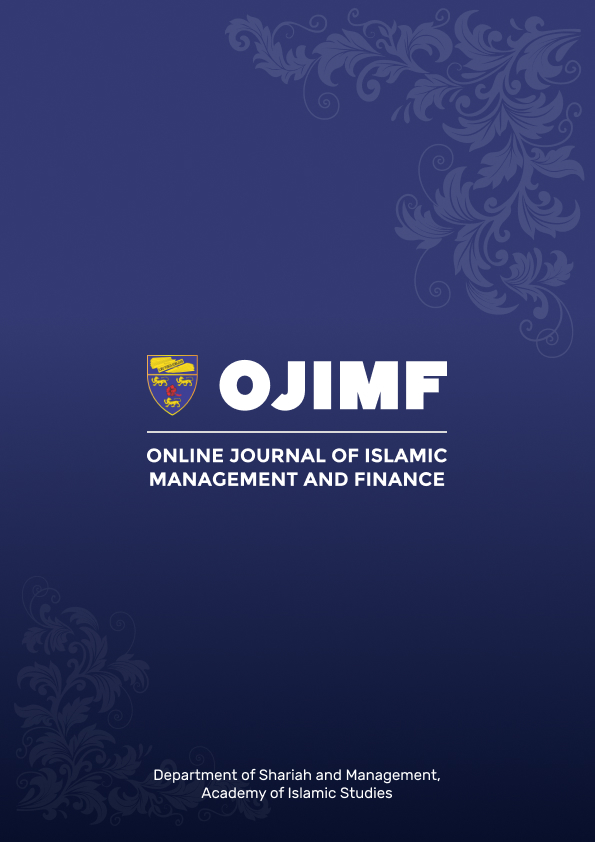REGULATORY CONFLICT BETWEEN HALAL CERTIFICATION AND HOME FOOD INDUSTRY (P-IRT) LICENSE IN INDONESIA
Main Article Content
Abstract
Recently, there has been a misalignment or overlap between regulations governing halal certification and the Home Industry Food Permit (P-IRT) in Indonesia. Products that have obtained distribution permits from the National Agency of Drug and Food Control (BPOM) or have PIRT certificates have been withdrawn by the Halal Task Force because they did not display the halal logo, even though they meet food safety standards. This study aims to analyze the main causes of regulatory issues between halal certification and the Home Industry Food Permit (P-IRT) in Indonesia, as well as provide effective recommendations for policy restructuring among the Ministry of Religious Affairs, the National Agency of Drug and Food Control (BPOM), the Health Office, and other relevant stakeholders. This study employs a qualitative approach by analyzing existing policies related to documents governing halal certification and P-IRT regulations, as well as its challenges and coordination among agencies. The findings indicate that the main cause of this issue is differences in interpretation, such as the varying definitions of the term "food product" and procedural interpretation. Furthermore, inadequate understanding of regulations arises from two standards that are not always aligned in technical requirements, such as hygiene requirements. Lastly, weak coordination between institutions is caused by the duality of supervision and certification, which are not integrated. These issues significantly impact business actors, especially Micro, Small and Medium Enterprises (MSMEs), who are often hindered in marketing their products. This study contributes to the development of a more harmonious policy framework between halal certification regulations and the Home Industry Food Permit (P-IRT). Furthermore, this study enriches the understanding of how halal product supervision, food safety and distribution permits can be implemented in a more integrated manner, in line with the principles of Islamic economics that support sustainability and the well-being of society. This study also recommends the need for procedure alignment, simplification or streamlining of procedures, and improved coordination between agencies through an integrated system. Thus, the synergy between halal certification and product distribution permits will not only strengthen national food security but also contribute to economic and social sustainability, increase public trust in local products, and support the management of Islamic wealth for a more sustainable future.
Downloads
Article Details
References
Airlangga, R. and Y. Reykasari (2024). "Pertanggungjawaban Produsen Terhadap Peredaran Produk Industri Makanan Rumahan Tanpa Label." Jurnal Ilmiah Multidisiplin Terpadu, 8(7): 357-365.
Amanda, S. A. A., et al. (2024). "Strategi dan Pendekatan dalam Mengelola Konflik." Jurnal Manajemen dan Pendidikan Agama Islam, 2(6): 460-473.
Anggaeni, T. T. K. (2022). "Sosialisasi Cara Pengajuan SPP-IRT dan Sertifikasi Halal kepada UMKM Pengolahan Pangan." Dharmakarya, 11(3): 281-287.
Djakfar, I. and I. Isnaliana (2021). "Model Pendampingan pengurusan sertifikasi produk makanan halal bagi umkm dalam mendukung Banda Aceh menjadi kota wisata halal." Wikrama Parahita: Jurnal Pengabdian Masyarakat, 5(1): 80-88.
Fahira, K. T. and R. M. Yasin (2022). "Peningkatan Nilai Produk Melalui Perijinan PIRT, Sertifikasi Halal dan Digital Marketing Pada UMKM Sirup Parijoto." SEMAR (Jurnal Ilmu Pengetahuan, Teknol. dan Seni bagi Masyarakat), 11(2): 173-180.
Faridah, H. D. (2019). "Halal certification in Indonesia; history, development, and implementation." Journal of Halal Product and Research, 2(2): 68-78.
Jameelah, M., et al. (2022). "Pendampingan Legalitas Usaha, Spp-Irt, Dan Sertifikasi Halal Produk Umkm Desa Pagelaran, Kecamatan Malingping, Lebak, Banten." Aplikasia: Jurnal Aplikasi Ilmu-ilmu Agama, 22(2): 117-128.
Kurniaji, K. (2023). "Prosedur Proses Sertifikasi P-IRT (Pangan-Industri Rumah Tangga) pada UMKM Pasca-Pandemi Covid 19." Jurnal Multidisiplin West Science, 2(03): 200-214.
Kurniawan, M. F., et al. (2022). "Pendampingan Perizinan PIRT dan Sertifikasi Halal Produk Bakpia dan Makanan Ringan Pelaku Umkm Dusun Lopati, Trimurti, Srandakan, Bantul." Jurnal Pengabdian pada Masyarakat Membangun Negeri, 6(2): 213-224.
Munfarida, B. (2024). Dukung Wajib Halal Tahap Oktober 2024, Satgas Halal Jawa Tengah Lakukan Pengawasan Secara Serentak di 35 Kab/Kota, Kementerian Agama Provinsi Jawa Tengah.
Murwadji, T. and A. Saraswati (2019). "Peningkatan Kapasitas Bisnis Usaha Mikro Kecil Melalui Sertifikasi Produk Pangan Industri Rumah Tangga." Jurnal Poros Hukum Padjadjaran, 1(1): 13-31.
Ningrum, R. T. P. (2022). "Problematika Kewajiban Sertifikasi Halal bagi Pelaku Usaha Mikro dan Kecil (UMK) di Kabupaten Madiun." Istithmar, 6(1): 43-58.
Nur, H., et al. (2023). "Pendampingan Penyusunan Dokumen Perijinan Usaha Bagi Peluku Usaha Mikro Dan Kecil Di Kabupaten Kediri." COMVICE: Journal Of Community Service, 7(2). 51-56.
Pamuji, S. (2024). Kewajiban Sertifikasi Halal Produk UMK Ditunda, Menag: Bentuk Keberpihakan Pemerintah, Kementerian Agama Republik Indonesia.
Pratami, N. W. C. A., et al. (2022). "Sosialisasi Ijin PIRT Dan Penggunaan Bahasa Pada Label Kemasan IRT Jajan Bali di Desa Pejeng Kabupaten Gianyar." WIDYABHAKTI, Jurnal Ilmiah Populer, 5(1): 32-40.
Putri, A. A., et al. (2023). "Penerapan CPPB-IRT dan sistem jaminan produk halal sebagai upaya peningkatan mutu dan kehalalan produk UMKM." Jurnal Inovasi Hasil Pengabdian Masyarakat (JIPEMAS), 6(2): 373-391.
Rahayu, S. W. and T. A. Yani (2020). "The Implementation Of Legal Protection And Certainty Principles For Consumer Of Food And Beverage Related To Micro And Small Businesses In Aceh." Hamdard Islamicus, 43(5): 650-657.
Rahmawati, D. (2024). "Pentingnya Sertifkasi Pirt Pada Industri Rumah Tangga: Literature Review Articel." Jurnal Inovasi Kesehatan Adaptif, 6(2): 51-59.
Sari, W. and I. Faniyah (2021). "Penerapan Sanksi Bagi Pelaku Usaha Yang Mengedarkan Produk Pangan Tanpa Label Halal Pada Kemasan Di Kota Padang." Unes Journal of Swara Justisia, 5(2): 175-187.
Simbolon, S. E. A. and N. W. Hidayat (2021). "Prosedur dan Problematika Sertifikasi Halal Di Indonesia." Masyrif: Jurnal Ekonomi, Bisnis dan Manajemen, 2(1): 118-132.
Sunardi, D., et al. (2024). "Legal Awareness of Micro and Small Enterprise Operators Regarding Halal Certification: A Maslaha Perspective." Ijtihad: Jurnal Wacana Hukum Islam dan Kemanusiaan, 24(1): 23-45.
Thomas, K. W. (2008). "Thomas-kilmann conflict mode." TKI Profile and Interpretive Report. 1: 1-11.
Yani, A. (2024). Satgas Halal Kemenag Aceh Lakukan Pengawasan di 70 Lokasi se-Aceh, Kementerian Agama Provinsi Aceh.
Yuanitasari, D., et al. (2023). "Tantangan Regulasi Halal Untuk Pelaku Usaha Mikro dan Kecil: Sebuah Studi Socio-Legal di Kupang Nusa Tenggara Timur." Acta Diurnal Jurnal Ilmu Hukum Kenotariatan, 6(2): 254-265

